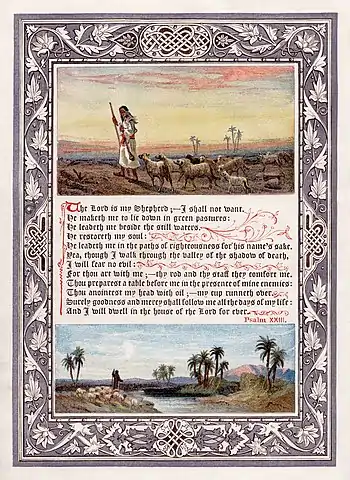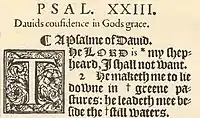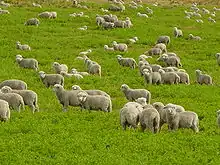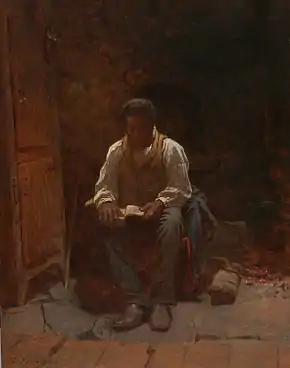Psalm 23
Psalm 23 is the 23rd psalm of the Book of Psalms, generally known in English by its first verse, in the King James Version, "The Lord is my Shepherd". The Book of Psalms is the third section of the Hebrew Bible,[1] and a book of the Christian Old Testament. In the Greek Septuagint version of the Bible, and in its Latin translation in the Vulgate, this psalm is Psalm 22 in a slightly different numbering system. In Latin, it is known by the incipit, "Dominus reget me".[2]
| Psalm 23 | |
|---|---|
| "The Lord is my Shepherd" | |
 Illustration from The Sunday at Home, 1880 | |
| Other name |
|
| Written | around 1000 BC |
| Text | attributed to King David |
| Language | Hebrew (original) |
Like many psalms, Psalm 23 is used in both Jewish and Christian liturgies. It has been set to music often. It has been called the best-known of the psalms for its universal theme of trust in God.[3]
Text
Hebrew Bible version
Following is the Hebrew text of Psalm 23:[4]
| Verse | Hebrew |
|---|---|
| 1 | מִזְמ֥וֹר לְדָוִ֑ד יְהֹוָ֥ה רֹ֜עִ֗י לֹ֣א אֶחְסָֽר |
| 2 | בִּנְא֣וֹת דֶּ֖שֶׁא יַרְבִּיצֵ֑נִי עַל־מֵ֖י מְנֻח֣וֹת יְנַֽהֲלֵֽנִי |
| 3 | נַפְשִׁ֥י יְשׁוֹבֵ֑ב יַנְחֵ֥נִי בְמַעְגְּלֵי־צֶ֜֗דֶק לְמַ֣עַן שְׁמֽוֹ |
| 4 | גַּ֚ם כִּֽי־אֵלֵ֨ךְ בְּגֵ֪יא צַלְמָ֡וֶת לֹא־אִ֘ירָ֚א רָ֗ע כִּי־אַתָּ֥ה עִמָּדִ֑י שִׁבְטְךָ֥ וּ֜מִשְׁעַנְתֶּ֗ךָ הֵ֣מָּה יְנַֽחֲמֻֽנִי |
| 5 | תַּֽ֘עֲרֹ֤ךְ לְפָנַ֨י שֻׁלְחָ֗ן נֶ֥גֶד צֹֽרְרָ֑י דִּשַּׁ֖נְתָּ בַשֶּׁ֥מֶן רֹ֜אשִׁ֗י כּוֹסִ֥י רְוָיָֽה |
| 6 | אַ֚ךְ ט֣וֹב וָחֶ֣סֶד יִ֖רְדְּפוּנִי כָּל־יְמֵ֣י חַיָּ֑י וְשַׁבְתִּ֖י בְּבֵית־יְ֜הֹוָ֗ה לְאֹ֣רֶךְ יָמִֽים |
King James Version

- A Psalm of David.
- The LORD is my shepherd; I shall not want.
- He maketh me to lie down in green pastures: he leadeth me beside the still waters.
- He restoreth my soul: he leadeth me in the paths of righteousness for his name's sake.
- Yea, though I walk through the valley of the shadow of death, I will fear no evil: for thou art with me; thy rod and thy staff they comfort me.
- Thou preparest a table before me in the presence of mine enemies: thou anointest my head with oil; my cup runneth over.
- Surely goodness and mercy shall follow me all the days of my life: and I will dwell in the house of the LORD for ever.
Interpretation of themes

The theme of God as a shepherd was common in ancient Israel and Mesopotamia. For example, King Hammurabi, in the conclusion to his famous legal code, wrote: "I am the shepherd who brings well-being and abundant prosperity; my rule is just.... so that the strong might not oppress the weak, and that even the orphan and the widow might be treated with justice."[5] This imagery and language was well known to the community that created the Psalm, and was easily imported into its worship.
Psalm 23 portrays God as a good shepherd, feeding (verse 1) and leading (verse 3) his flock. The "rod and staff" (verse 4) are also the implements of a shepherd. Some commentators see the shepherd imagery pervading the entire psalm. It is known that the shepherd is to know each sheep by name, thus when God is given the analogy of a shepherd, he is not only a protector but also the caretaker. God, as the caretaker, leads the sheep to green pastures (verse 2) and still waters (verse 2) because he knows that each of his sheep must be personally led to be fed. Thus, without its Shepherd, the sheep would die either by a predator or of starvation, since sheep are known for their helplessness without their shepherd.
J. Douglas MacMillan argues that verse 5 ("Thou preparest a table before me") refers to the "old oriental shepherding practice" of using little raised tables to feed sheep.[6] Similarly, "Thou anointest my head with oil" may refer to an ancient form of backliner – the oil is poured on wounds, and repels flies. MacMillan also notes that verse 6 ("Goodness and mercy shall follow me") reminds him of two loyal sheepdogs coming behind the flock.[7]
John Ellinwood argues that in verses 4 and 5 King David acknowledges God's protection in expeditions and in battles. "Thou preparest a table before me in the presence of mine enemies" refers to the sober raucous dinner before major battles. These were raucous in order to demoralize hostiles camped within earshot, and (only) the king ate from a table. "Thou anointest my head with oil" because tomorrow this ceremony might be impossible. After each victory there was no longer a need for sobriety, so "my cup runneth over." The king's lyricist wisely shortened these military verses for balance. Also in Psalm 18 David mentions God's protection in battle.
The first verse of the Psalm ascribes authorship to King David, said in the Hebrew Scriptures to have been a field shepherd himself as a youth. However, some scholars do not agree with this attributed authorship, and hypothesize various other possibilities, commonly dating it to the post-exilic period.[8]
Taken together, Psalm 22, 23 and 24, is seen by some as shepherd psalms, where the good shepherd lays down his life for the sheep as suffering servant and king.[9]
Uses in Judaism
Psalm 23 is traditionally sung during the third Shabbat meal[10][11] as well as before first and second in some of the Jewish communities. It is also commonly recited in the presence of a deceased person, such as by those keeping watch over the body before burial, and at the funeral service itself.[12][13]
Uses in Christian tradition

For Christians the image of God as a shepherd evokes connections not only with David but with Jesus, described as "Good Shepherd" in the Gospel of John. The phrase about "the valley of the shadow of death" is often taken as an allusion to the eternal life given by Jesus.
Orthodox Christians typically include this Psalm in the prayers of preparation for receiving the Eucharist.
The Reformation inspired widespread efforts in western Europe to make biblical texts available in vernacular languages. One of the most popular early English versions was the Geneva Bible (1557). The most widely recognized version of the psalm in English today is undoubtedly the one drawn from the King James Bible (1611).
In the Roman Catholic Church, this psalm is sung as a responsorial in Masses for the dead.
The psalm is a popular passage for memorization and is often used in sermons.
Use in funerals
In the twentieth century, Psalm 23 became particularly associated with funeral liturgies in the English-speaking world, and films with funeral scenes often depict a graveside recitation of the psalm. Official liturgies of English-speaking churches were slow to adopt this practice, though. The Book of Common Prayer of the Church of England has only Psalms 39 and 90 in its order for the burial of the dead, and in the Episcopal Church in the United States, Psalm 23 was not used for funerals until the 1928 revision of the prayer book.
Musical settings
Metrical versions
In Christianity, a number of paraphrased versions of Psalm 23 emerged after the Protestant Reformation in the form of Metrical psalms — poetic versions that could be set to hymn tunes. An early metrical version of the psalm in English was made in 1565 by Thomas Sternhold. Other notable metrical versions to emerge from this period include those from The Bay Psalm Book (1640),[14] the Sidney Psalms by Philip Sidney, and settings by George Herbert and Isaac Watts.[14]
One of the best known metrical versions of Psalm 23 is the Christian hymn, "The Lord's my Shepherd", a translation first published in the 1650 Scottish Psalter.[15] Although widely attributed to the English Parliamentarian Francis Rous, the text was the result of significant editing by a translating committee in the 1640s before publication.[16] The hymn is one of the most popular hymns amongst English-speaking congregations today, and it is traditionally sung to the hymn tune Crimond, generally attributed to Jessie Seymour Irvine.[17][18] Other melodies, such as Brother James' Air or Amazing Grace, Belmont, Evan, Martyrdom, Orlington, and Wiltshire may also used.[19]
Another popular Christian hymn to be based on Psalm 23 is "The King of Love My Shepherd Is" by Henry Baker (1868).[20]
| Sternhold and Hopkins (1628)[21] | Bay Psalm Book (1640)[22] | Rous Psalter (1643)[23] | The Scottish Psalter (1650)[24] |
|---|---|---|---|
The Lord is only my support, |
The Lord to me a shepherd is, |
My Shepherd is the Living Lord |
The Lord's my Shepherd, I'll not want; |
Liturgical and classical
- Bach: Cantata No.112 Der Herr ist mein getreuer Hirt, BWV 112
- James Leith Macbeth Bain: hymn tune Brother James' Air
- Rabbi Ben Zion Shenker: Notable performance by Itzhak Perlman and Cantor Yitzchak Meir Helfgot [25]
- Lennox Berkeley: Op. 91, No. 1 (1975)
- Bernstein: Chichester Psalms (Hebrew, in Part 2, together with Psalm 2)
- Bruckner: Psalm 22 Der Herr regieret mich WAB 34 (c. 1852)
- Noah Creshevsky: Psalm XXIII (2003)
- Paul Creston: Psalm XXIII (1945)
- Dvořák: verses 1–4, No. 4 of his Biblical Songs (1894)
- Herbert Howells: Hymnus Paradisi
- Jessie Seymour Irvine: hymn tune Crimond
- Friedrich Kiel: verse 4 in No. 1 of his Six Motets, Op. 82
- Albert Hay Malotte
- Clément Marot (in Latin)
- George Rochberg[26]
- Miklós Rózsa[27]
- Edmund Rubbra: Three Psalms, Op. 61 (No. 2)
- John Rutter: The Lord is my Shepherd (1978), included in his Requiem (1985)
- Franz Schubert: "Gott meine Zuversicht" ("Gott ist mein Hirt", 1820) (German text by Moses Mendelssohn)[28]
- Charles Villiers Stanford: "The Lord is my Shepherd" (1886)[29]
- Randall Thompson[30]
- Ralph Vaughan Williams[31]
- Alexander Zemlinsky: Op. 14, (1910) for chorus and orchestra
- Rabbi Shlomo Carlebach: Gam Ki Elech b'Gey Tzalmavet Lo Irah Rah Ki Atah Imadi. גם כי אלך [32]
Songs
- 1958: Duke Ellington – "Part VI" from Black, Brown and Beige with Mahalia Jackson
- 1966: The Moody Blues – "23rd Psalm" from the album The Magnificent Moodies deLuxe Edition (not released until 2014)
- 1966: Ed Ames – "My Cup Runneth Over" RCA Victor single from the Musical Production "I Do!, I Do!"
- 1972: Dave Cousins – "Lay Down" from the album Bursting at the Seams
- 1977: Dennis Brown – "Here I Come" from the album Wolf & Leopards
- 1977: Peter Tosh – "Jah Guide" from the album Equal Rights
- 1977: Pink Floyd – "Sheep" from the album Animals
- 1978: Patti Smith Group – "Privilege (Set Me Free)" from the album Easter
- 1980: The Grateful Dead – "Alabama Getaway" from the album Go to Heaven
- 1981: Venom – "Welcome To Hell" from the album Welcome to Hell
- 1982: Keith Green – "The Lord is My Shepherd" from the album Songs for the Shepherd
- 1983: Marillion – "Forgotten Sons" from the album Script for a Jester's Tear
- 1985: Judy Collins – "The Lord is my Shepherd" from the album Amazing Grace
- 1988: Diamanda Galás – "The Lord is my Shepherd" from the album You Must Be Certain of the Devil
- 1988: U2 – "Love Rescue Me" from the album Rattle and Hum
- 1989: Lil' Louis – "Blackout" from the album From The Mind Of Lil Louis
- 1990: Bobby McFerrin – "The 23rd Psalm" from the album Medicine Music
- 1993: Alpha Blondy – "Psaume 23" from the album Jerusalem
- 1993: Christian Death – Psalm (Maggot's Lair) from album Path of Sorrows
- 1993: Midnight Oil – "In the Valley" from album Earth and Sun and Moon
- 1994: Howard Goodall – theme to The Vicar of Dibley, later covered by Katherine Jenkins and The Choirboys
- 1995: Coolio feat. L.V. – "Gangsta's Paradise"
- 1995: Michael W. Smith – "As It Is In Heaven" from I'll Lead You Home
- 1995: Tupac Shakur – "So Many Tears" from the album Me Against The World
- 1996: Cissy Houston, (Whitney Houston's mother) – "The Lord is My Shepherd" from The Preacher's Wife: Original Soundtrack Album
- 1996: Staind “Four Walls” from the album Tormented
- 1997: Christopher Wallace (The Notorious B.I.G.) – "You're Nobody ('Til Somebody Kills You)" from the album Life After Death
- 1998: Colin Mawby – recording with Charlotte Church
- 1998: Kathy Troccoli – "Psalm 23" from Corner of Eden
- 1998 Colourblind - "Psalms 23"
- 1999: E Nomine – "Psalm 23" from the album Das Testament
- 1999: Jonathan Elias – "Forgiveness" from the album The Prayer Cycle
- 1999: Ky-mani Marley – "Lord is My Shepherd" from the album The Journey
- 2000: Marilyn Manson – "In The Shadow Of The Valley Of Death" from the album Holy Wood
- 2001: Dan Nichols – "Psalm 23" from the album Be Strong
- 2002: Boards of Canada – "From One Source All Things Depend" from the album Geogaddi
- 2003: Lucinda Williams – "Atonement" from the album World Without Tears
- 2004: Kanye West – "Jesus Walks" from the album The College Dropout
- 2004: Megadeth – "Shadow of Deth" from the album The System Has Failed
- 2004: OverClocked Remix – "Beneath the Surface (Aquatic Ambiance)" from Kong in Concert
- 2005: Ministry (band) – "No W (Redux)" from Rantology
- 2007: Group 1 Crew – "Forgive Me" from the album Group 1 Crew
- 2007: Dream Theater – "In The Presence Of Enemies Part 2" from the album Systematic Chaos
- 2008: Jon Foreman – "The House of God, Forever" from the EP, Summer
- 2008: The Offspring – "Hammerhead" from the album Rise and Fall, Rage and Grace
- 2009: India.Arie, MC Lyte – "Psalms 23" from the album Testimony: Vol. 2, Love & Politics
- 2009: Rick Ross – "Valley of Death" from the album Deeper Than Rap
- 2010: Nas & Damian Marley – "Strong Will Continue" from the album Distant Relatives
- 2011: Hollywood Undead – "Hear Me Now" from the album American Tragedy
- 2016: The Last Shadow Puppets - "Everything You've Come to Expect" from the album of the same name
References
- Mazor 2011, p. 589.
- Parallel Latin/English Psalter / Psalmus 22 (23) medievalist.net
- Heller, Rebbetzin Tziporah (3 August 2002). "The Lord is My Shepherd". Aish.com. Retrieved 28 June 2018.
- "Tehillim – Psalms – Chapter 23". Chabad.org. 2018. Retrieved 29 June 2018.
- "Hammurabi's Code, circa 1780BC". history.hanover.edu. Retrieved 2017-12-12.
- J. Douglas MacMillan, The Lord of Shepherd. (Bryntirion: Evangelical Press of Wales, 1988), 78.
- J. Douglas MacMillan, The Lord of Shepherd. (Bryntirion: Evangelical Press of Wales, 1988), 82.
- Morgenstern, Julian (March 1946). "Psalm 23". Journal of Biblical Literature. 65 (1): 13–24. doi:10.2307/3262214. JSTOR 3262214.
- http://www.plymouthbrethren.org/article/6484
- Abramowitz, Rabbi Jack (2018). "Possibly the Most Famous Psalm of All". Orthodox Union. Retrieved 28 June 2018.
- Jungreis, Rebbetzin Esther (18 April 2011). "The Tragic Vacuum (Part Four)". The Jewish Press. Retrieved 28 June 2018.
- Olitzky, Kerry M.; Raphael, Marc Lee; Raphael, Marc (2000). An Encyclopedia of American Synagogue Ritual. Greenwood Publishing Group. p. 188. ISBN 0313308144.
- Lamm, Maurice. "Jewish Funeral Service & Eulogy". Chabad.org. Retrieved 29 June 2018.
- "'Psalms Compared: Psalm 23', retrieved 2007-08-05. (no public access!)". Smith Creek Music. 2007-01-17. Archived from the original on 2015-03-22. Retrieved 2014-03-12.
- Scottish Psalter and Paraphrases Archived 2006-11-16 at the Wayback Machine at CCEL
- Petersen, Randy (2014). Be Still, My Soul: The Inspiring Stories behind 175 of the Most-Loved Hymns. Tyndale House Publishers, Inc. ISBN 978-1-4143-8842-7. Retrieved 3 June 2020.
- "Crimond". Center for Church Music – Songs & Hymns. Retrieved 2008-10-07.
- Ewan, Elizabeth L.; Innes, Sue; Reynolds, Sian; Pipes, Rose (2007). Biographical Dictionary of ScottishWomen. Edinburgh University Press. ISBN 978-0-7486-2660-1. Retrieved 3 June 2020.
- http://www.hymntime.com/tch/htm/l/m/lmysheph.htm%5B%5D
- Famous Hymns and Their Authors. Hodder and Stoughton. 1903. p. 178. Retrieved 17 June 2020.
- "Psalm 23, Sternhold and Hopkins". www.cgmusic.org. Retrieved 17 June 2020.
- "Psalm 23 · Bay Psalm Book · Scriptures (goodbooksfree.com)". goodbooksfree.com. 2020. Retrieved 17 June 2020.
- "Evangelical Lutheran Hymnary Handbook". dokumen.tips. Worship Committee of the Evangelical Lutheran Synod. Retrieved 3 June 2020.
- "The Lord's My Shepherd". Hymnary.org. Retrieved 17 June 2020.
- Itzhak Perlman and Cantor Yitzchak Meir Helfgot perform Ben-Zion Shenker's Mizmor leDavid(YouTube).
- Together with Psalm 43 and Psalm 150 in an a capella setting for mixed chorus written in 1954. Dixon, Joan (1992). George Rochberg: A Bio-Bibliographic Guide to His Life and Works. Hillsdale, New York: Pendragon Press, p. 175.
- The Miklós Rózsa Society Website
- School of Music, Theatre & Dance (University of Michigan) Publications. School of Music, University of Michigan. 1880. Retrieved 17 June 2020.
- #NOV290116. Novello & Co Ltd.
- Blotner, Linda Solow (1983). The Boston Composers Project: A Bibliography of Contemporary Music. Cambridge, Massachusetts: MIT Press, p. 547.
- "Settings of: Psalm 23". ChoralNet. Retrieved 2012-02-25.
- Gem Ki Elech 1(YouTube).
Bibliography
- Mazor, Lea (2011). Berlin, Adele; Grossman, Maxine (eds.). Book of Psalms. The Oxford Dictionary of the Jewish Religion. Oxford University Press. ISBN 978-0-19-973004-9.
External links
| Wikimedia Commons has media related to Psalm 23. |
| Wikisource has original text related to this article: |
- Pieces with text from Psalm 23: Scores at the International Music Score Library Project
- Psalm 23: Free scores at the Choral Public Domain Library (ChoralWiki)
- Psalm 23 in Parallel English (JPS translation) and Hebrew
- BibleStudyTools.com – various translations and commentaries
- Psalm 23 at biblegateway.com
- Hymns for Psalm 23 hymnary.org
- Hebrew text, translation, transliteration, recorded melodies from The Zemirot Database
- Tehillim – Psalm 23 (Judaica Press) translation with Rashi's commentary.
- Oldham, Jeffrey D. (17 February 2006). "Various Translations of Psalm 23" (PDF). Stanford University.